I do not know that the fly in amber is of any particular use, but the Comic idea enclosed in a comedy makes it more generally perceptible and portable, and that is an advantage. There is a benefit to men in taking the lessons of Comedy in congregations, for it enlivens the wits; and to writers it is beneficial, for they must have a clear scheme, and even if they have no idea to present, they must prove that they have made the public sit to them before the sitting to see the picture. And writing for the stage would be a corrective of a too-incrusted scholarly style, into which some great ones fall at times. It keeps minor writers to a definite plan, and to English. Many of them now swelling a plethoric market, in the composition of novels, in pun-manufactories and in journalism; attached to the machinery forcing perishable matter on a public that swallows voraciously and groans; might, with encouragement, be attending to the study of art in literature. Our critics appear to be fascinated by the quaintness of our public, as the world is when our beast-garden has a new importation of magnitude, and the creatures appetite is reverently consulted. They stipulate for a writer’s popularity before they will do much more than take the position of umpires to record his failure or success. Now the pig supplies the most popular of dishes, but it is not accounted the most honoured of animals, unless it be by the cottager. Our public might surely be led to try other, perhaps finer, meat. It has good taste in song. It might be taught as justly, on the whole, and the sooner when the cottager’s view of the feast shall cease to be the humble one of our literary critics, to extend this capacity for delicate choosing in the direction of the matter arousing laughter.




